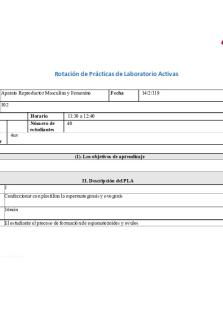PLA 6 - BBC NEWS PDF

| Title | PLA 6 - BBC NEWS |
|---|---|
| Author | MPF 02 |
| Course | Introducción cultural al mundo anglófono |
| Institution | Universidad de Oviedo |
| Pages | 2 |
| File Size | 182.7 KB |
| File Type | |
| Total Downloads | 28 |
| Total Views | 134 |
Summary
PLA 6...
Description
BBC NEWS http://news.bbc.co.uk/2/hi/uk_news/magazine/3714293.stm Last Updated: Friday, 14 May, 2004, 11:02 GMT 12:02 UK By Giles Wilson BBC News Online Magazine
Old news: How the broadsheets looked in 1995
Newspaper readers in the UK have for decades had a simple choice: tabloid or broadsheet. From next week it's not so clear. Friday's edition of The Independent is the last as a broadsheet. From Monday the newspaper completes a process started seven months ago, and will be printed only as a tabloid. The Times is also encouraging its readers to choose its tabloid version. The Daily Telegraph is considering a similar move. The Guardian says it isn't, but could adopt a middle-sized format, according to reports. One thing is clear: the terms tabloid and broadsheet are now no longer useful. "The tabloids" or "The tabs" ceases to refer to just the Sun, Mirror, Star, Express and Mail and their Sunday counterparts. The phrase "tabloid journalism", first used in 1901 meaning newspapers "in a small format which handle stories in an easily assimilable and often sensational way" (OED), is also in trouble. And the word "broadsheet", dating back at least as far as 1705, initially a descriptive term of width, will no longer be synonymous with the Times, Telegraph, Guardian, Independent and Financial Times. Subjective terms As any reader knows, more than describing the size of the paper, the terms are really about the different journalistic styles and attitudes. As Ed King, head of the newspaper collection at the British Library puts it, the terms have "rather subjective connotations applied to each, often by those who have something to gain or lose from the situation". Thus broadsheets think of themselves as "the quality press" - while for them and their readers tabloids denote big brash headlines, Page 3 nudes, paparazzi pictures, tittle-tattle, celebrity Arms wide open: Farewell to the long stretch
gossip and a lack of seriousness. The tabloids on the other hand think of themselves as "the popular press", and regard broadsheets as dull, wordy and worthy. Kelvin MacKenzie, a former editor of the Sun whose brash style gave the world "GOTCHA" and still embodies for many people the essence of tabloid journalism, used to take pleasure in calling the broadsheets "the unpopular press". Nothing new under the sun The situation for readers, who may for years have considered themselves broadsheet or tabloid buyers, may become just as confusing. But any notion that there have historically been just two sizes of newspaper are misguided. Fashion, technology, and editorial decisions have meant all sorts of sizes of paper have been published since newspapers as we would recognise them started appearing in the 1750s. Eighteenth Century papers were often printed in tabloid format, as periodicals, says Ed King. "There wasn't a great deal of difference between newspapers and magazines. Magazines contained news, and newspapers contained magazine-type stories. People think this is a new thing, but it's not true." Justin Lewis, professor of communication at the Cardiff School of Journalism, wonders how he and his students will now refer to the papers formerly known as broadsheets. "For those of us who have to analyse these things every day, it's a real problem. Everyone concerned with moving broadsheets to tabloid avoids using the term - they always say 'compact'. They obviously feel the word tabloid will say something about their journalism." Neither the word "compact" nor other occasionally-suggested words like "broadloid" or "qualoid" quite works, though. When Fleet St was Fleet St (1971)
It may well be, he says, that the existing terms will live on, and that people will still talk of tabloid papers and broadsheet papers, whatever size paper they are printed on. After all, there is a good precedent for a historical term which once meant something definite being reinvented to take account of a changing world: Fleet Street....
Similar Free PDFs

PLA 6 - BBC NEWS
- 2 Pages

TV NEWS - Lecture notes 6
- 9 Pages

Pla Docent (Català) - sss
- 15 Pages

Pla docent assignatura
- 11 Pages

Pogil PLA 1 Assignment
- 7 Pages

Pla docent 2021
- 9 Pages

Soft news and hard news
- 5 Pages

BBC Writers Room Lecture
- 1 Pages

Resenha Maria Montessori BBC
- 3 Pages

BBC design rules
- 3 Pages

Othello BBC qs
- 1 Pages

BBC Iplayer Stormed Capitol
- 1 Pages

PLA Aparato Reproductor
- 7 Pages

Pla docent - Nota: alta
- 8 Pages

Tipo test pla d\'empresa
- 4 Pages
Popular Institutions
- Tinajero National High School - Annex
- Politeknik Caltex Riau
- Yokohama City University
- SGT University
- University of Al-Qadisiyah
- Divine Word College of Vigan
- Techniek College Rotterdam
- Universidade de Santiago
- Universiti Teknologi MARA Cawangan Johor Kampus Pasir Gudang
- Poltekkes Kemenkes Yogyakarta
- Baguio City National High School
- Colegio san marcos
- preparatoria uno
- Centro de Bachillerato Tecnológico Industrial y de Servicios No. 107
- Dalian Maritime University
- Quang Trung Secondary School
- Colegio Tecnológico en Informática
- Corporación Regional de Educación Superior
- Grupo CEDVA
- Dar Al Uloom University
- Centro de Estudios Preuniversitarios de la Universidad Nacional de Ingeniería
- 上智大学
- Aakash International School, Nuna Majara
- San Felipe Neri Catholic School
- Kang Chiao International School - New Taipei City
- Misamis Occidental National High School
- Institución Educativa Escuela Normal Juan Ladrilleros
- Kolehiyo ng Pantukan
- Batanes State College
- Instituto Continental
- Sekolah Menengah Kejuruan Kesehatan Kaltara (Tarakan)
- Colegio de La Inmaculada Concepcion - Cebu
